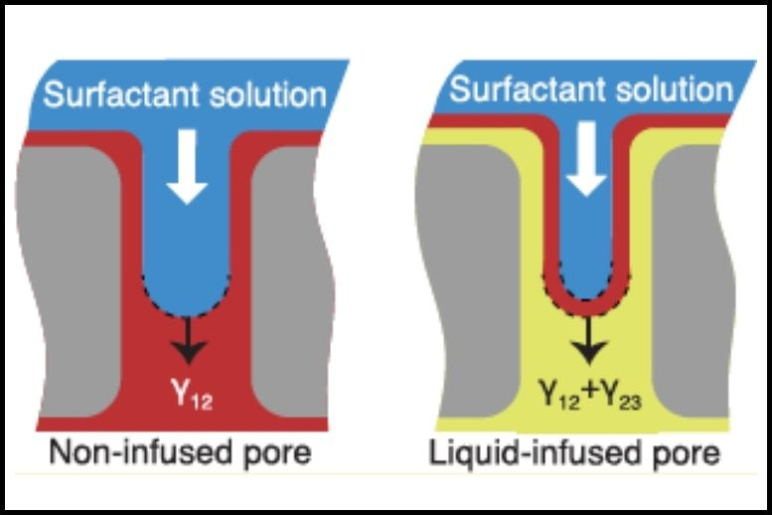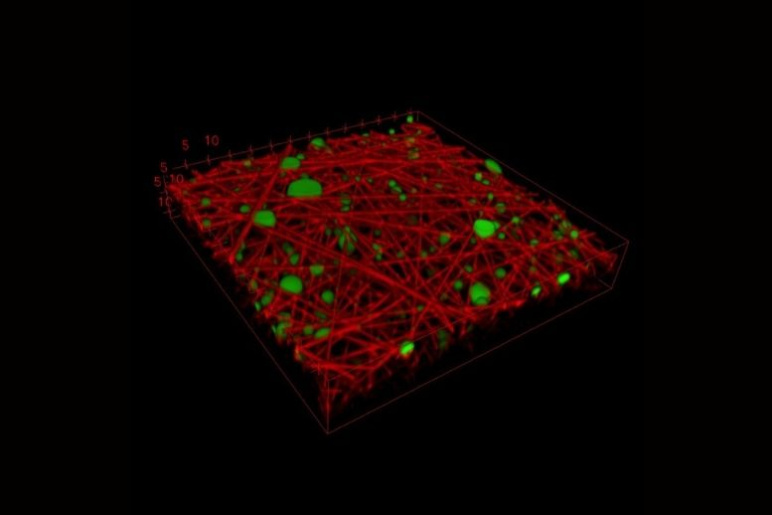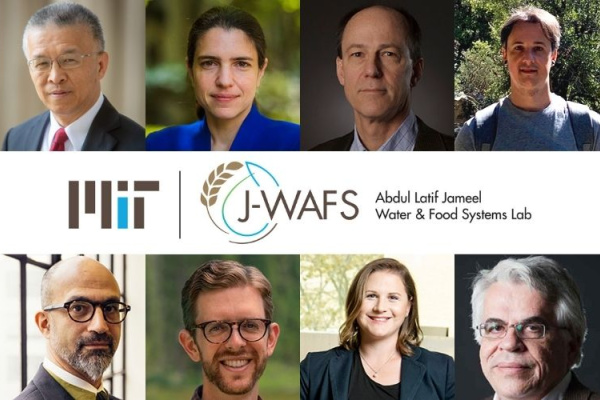Our Research Liquid-infused membranes to separate emulsified oils from water

Schematic illustration of the interfaces in non-infused and liquid-infused pores. Graphic credit: Bazyar et al., Langmuir 2019, 35, 9513.

3D reconstructions of a foulant (oil, green) on a hydrophilic fibrous microfilter (red) using the confocal laser scanning microscopy technique. Image credit: Lin et al., ACS Appl. Mater. Interf. 2019, 11, 17001.
Principal Investigator
Gregory C. Rutledge
- Lammot du Pont Professor of Chemical Engineering
- Department of Chemical Engineering
Gregory C. Rutledge is the Lammot du Pont Professor of Chemical Engineering at MIT. He served as director of the Program in Polymer Science and Technology and executive officer in Chemical Engineering. He is a Fellow of AIChE, APS, and PMSE Division of ACS. He received the AIChE Braskem Award, Fiber Society Founders Award, Morton Distinguished Visiting Professorship (University of Akron), and Thinker-in-Residence (Deakin University). His research entails the molecular engineering of soft matter, with publications on process-structure-property relationships for polymers and the fabrication, properties and applications of ultrafine fibers. Prof. Rutledge is editor for the Journal of Materials Science.
Photography credit: David Sella
Challenge:
How can liquid infused membranes (LIMs) be used to better separate oils from water without fouling?
Research Strategy
- Confocal laser scanning microscopy will be used to reconstruct the 3D structure of the LIM and the distribution of the several liquid phases (oil, water, infused liquid) as a function of time
- Based on these observations, a model for transport of the oil phase through the LIM will be developed, accounting for productivity and anti-fouling
- Robustness of the LIM technology for removal of different types of emulsified oils and oil mixtures will be evaluated
Project description
Oil-contaminated water is a major source of pollution to the environment. Emulsified oils represent a particular challenge to water reclamation and reuse due to their small droplet sizes and long settling times. Microfiltration is an attractive technology for the removal of emulsified oils, but its major drawback is fouling, which reduces productivity over time and requires frequent remediation. A new approach to the design of microfiltration membranes is needed that can eliminate fouling by oils and particulates.
This project will examine a new class of membranes called liquid infusion membranes (LIM) in which an infused liquid coats the surface and pores of the membrane. A proof of concept in the lab has shown that LIMs can remove emulsified oil droplets that are significantly smaller than the pore size of the membrane, with high selectivity for the oil and essentially no fouling of the membrane itself. This demonstration challenges our current understanding of the mechanism by which this separation occurs. In this project, separations of different oil types, 3D imaging, and transport modeling will be used to gain a fundamental understanding of the operative mechanisms, so that the LIM can be designed and optimized for application to real-world problems.
Outcomes
- Imaged the transport of oil from oil-in-water emulsions through a form of liquid-infused membranes (LIMs), using confocal laser scanning microscopy (CLSM)
- Proposed mechanisms for the observed capture and transport of emulsified oil through a LIM and developed approximate analytical models for each mechanism
- Validated analytical models for liquid entry pressure and channel formation as functions of infused liquid viscosity, pore diameter, contact angle and interfacial tension
- Developed analytical and numerical models for dynamics of penetration of pores by oil or water for a deeper understanding of the mechanism of the pore opening, helping developers of LIMs to identify and eliminate bottlenecks in transport through such membranes, and accelerate development of commercially viable, foulant-resistant membranes for oil-water separation
News
Additional Details
Impact Areas
- Water
Research Themes
- Water Purification & Desalination
Year Funded
- 2022
Grant Type
- Seed Grant
Status
- Completed

